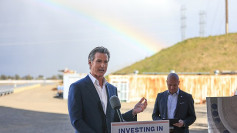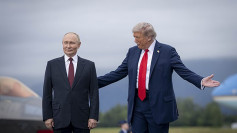The announcement that Meta will allow Donald Trump back on Facebook and Instagram after a two-year ban has outraged civil rights and online safety groups.
Trump was removed from Meta platforms following the Capitol riots on Jan. 6, 2021, during which he made baseless accusations that the election was rigged, cheered increasingly violent demonstrators, and criticized former Vice President Mike Pence even as the mob threatened his life.
The former U.S. president will be permitted to return to the platforms "in the coming weeks," but "with new guardrails in place to deter repeat offenses," Meta's president of global affairs, Nick Clegg, said in a blog post on Wednesday explaining the decision.
"The Capitol community is still picking up the pieces from the January 6th insurrection that Trump ignited, and now he is returning to the virtual scene of the crime," Democratic congresswoman Jan Schakowsky tweeted.
"Make no mistake - by allowing Donald Trump back on its platforms, Meta is refuelling Trump's misinformation and extremism engine," Angelo Carusone, president and CEO of media watchdog Media Matters for America, said.
Free Press Co-CEO Jessica J. González, condemned the move as a "cowardly and unethical decision" that "will cause incalculable harm".
"Meta must bear full responsibility for any harm that results from today's extremely reckless decision," González said.
She encouraged Meta to alter direction and warned Trump would simply continue to use the company's "powerful tools" to "spread lies and dangerous rhetoric, and incite violence targeted at disenfranchised communities and his ideological enemies".
Clegg said in a statement justifying the decision to allow Trump to return: "The public should be able to hear what their politicians are saying - the good, the bad and the ugly - so that they can make informed choices at the ballot box."
"In the event that Mr. Trump posts further violating content, the content will be removed and he will be suspended for between one month and two years, depending on the severity of the violation."
In the beginning, Meta delegated control over the choice of whether to permanently ban Trump to its oversight board, an entity made up of academics and ex-politicians who serve as an independent second set of eyes on Meta's moderation decisions.
In May 2021, that panel issued a decision saying that Trump's punishments shouldn't be "indeterminate," but it sent the ultimate decision back to Meta and had no bearing on whether he was allowed to rejoin the platform.
The Real Facebook Oversight Board, a group of academics, activists, and supporters that competes with Meta's board, claimed that the decision "sends a message that there are no real consequences even for inciting insurrection and a coup."
Some free speech activists agree with Clegg, arguing that the public should have access to political candidates' messaging.
Jameel Jaffer, executive director of Columbia University's Knight First Amendment Institute and a former American Civil Liberties Union official, defended the reinstatement. He previously supported the decision to suspend Trump's account.
"This is the right call - not because the former president has any right to be on the platform but because the public has an interest in hearing directly from candidates for political office," he said in a statement on Wednesday.
Trump did not specify whether he would return to the platform, but he did offer a brief comment on Truth Social in response to the news saying that "such a thing should never happen again to a sitting president."






